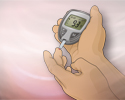Type 2 diabetes - what to ask your doctor
What to ask your provider about diabetes - type 2
Type 2 diabetes, once diagnosed, is a lifelong disease that causes a high level of sugar (glucose) in your blood. It can damage your organs. It can also lead to a heart attack or stroke and cause many other health problems. You can do many things to control your symptoms, prevent damage due to diabetes, and make your life better.
Below are questions you may want to ask your health care provider to help you take care of your diabetes.
Questions
Ask your provider to check the nerves, skin, and pulses in your feet. Also ask these questions:
- How often should I check my feet? What should I do when I check them? What problems should I call my provider about?
- Who should trim my toenails? Is it OK if I trim them?
- How should I take care of my feet every day? What type of shoes and socks should I wear?
- Should I see a foot doctor (podiatrist)?
Ask your provider about getting exercise, including:
- Before I start, do I need to have my heart checked? My eyes? My feet?
- What type of exercise program should I do? What type of activities should I avoid?
- When should I check my blood sugar when I exercise? What should I bring with me when I exercise? Should I eat before or during exercise? Do I need to adjust my medicines when I exercise?
When should I next have an eye doctor check my eyes? What eye problems should I call my doctor about?
Ask your provider about meeting with a dietitian. Questions for the dietitian may include:
- What foods increase my blood sugar the most?
- What foods can help me with my weight loss goals?
Ask your provider about your diabetes medicines:
- When should I take them?
- What should I do if I miss a dose?
- Are there any side effects?
How often should I check my blood sugar level at home? Should I do it at different times of the day? What is too low? What is too high? What should I do if my blood sugar is too low or too high?
Should I get a medical alert bracelet or necklace? Should I have glucagon at home?
Ask your provider about symptoms that you are having if they have not been discussed. Tell your provider about blurred vision, skin changes, depression, reactions at injection sites, sexual dysfunction, tooth pain, muscle pain, or nausea.
Ask your provider about other tests you may need, such as cholesterol, HbA1C, and a urine and blood test to check for kidney problems.
Ask your provider about vaccinations you should have like the COVID-19 vaccine, flu shot, hepatitis B, or pneumococcal (pneumonia) vaccines.
How should I take care of my diabetes when I travel?
Ask your provider how you should take care of your diabetes when you are sick:
- What should I eat or drink?
- How should I take my diabetes medicines?
- How often should I check my blood sugar?
- When should I call the provider?
References
American Diabetes Association website. 4. Comprehensive medical evaluation and assessment of comorbidities: standards of medical care in diabetes-2022. diabetesjournals.org/care/article/45/Supplement_1/S46/138926/4-Comprehensive-Medical-Evaluation-and-Assessment. Accessed July 25, 2022.
Crandall JP, Shamoon H. Diabetes mellitus. In: Goldman L, Schafer AI, eds. Goldman's Cecil Medicine. 26th ed. Philadelphia, PA: Elsevier; 2020:chap 216.
Riddle MC, Ahmann AJ. Therapeutics of type 2 diabetes mellitus. In: Melmed S, Auchus RJ, Goldfine AB, Koenig RJ, Rosen CJ, eds. Williams Textbook of Endocrinology. 14th ed. Philadelphia, PA: Elsevier; 2020:chap 35.
- Type 2 diabetes - what to ask your doctor
- Mastectomy and breast reconstruction - what to ask your doctor
- Before weight-loss surgery - what to ask your doctor
- Hip or knee replacement - before - what to ask your doctor
- Questions to ask your doctor before knee replacement
- Anesthesia - what to ask your doctor - adult
- Anesthesia - what to ask your doctor - child
Review Date: 7/25/2022
Reviewed By: Linda J. Vorvick, MD, Clinical Professor, Department of Family Medicine, UW Medicine, School of Medicine, University of Washington, Seattle, WA. Also reviewed by David C. Dugdale, MD, Medical Director, Brenda Conaway, Editorial Director, and the A.D.A.M. Editorial team.


